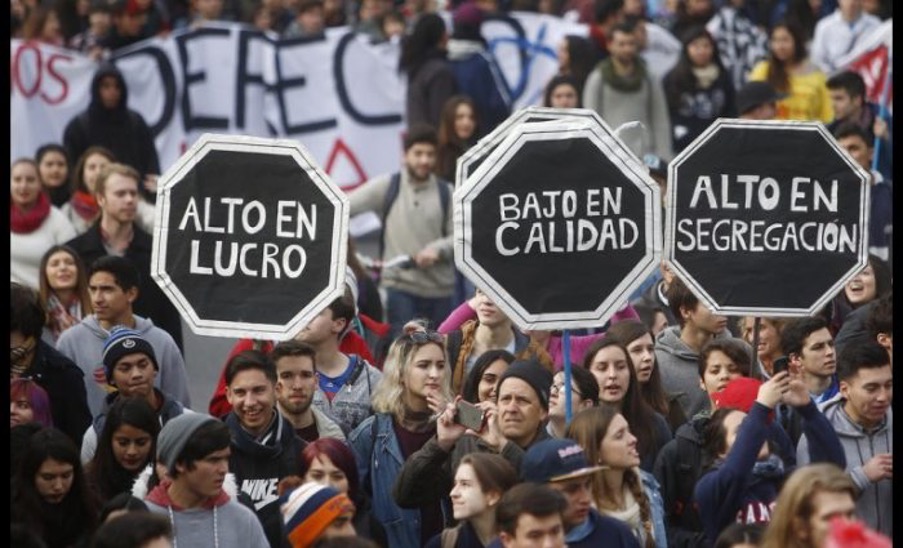On the 60th anniversary of the publication of the Robbins Report, Bob Roth explores the evolution of UK universities since 1963, from the student protests of the 70s to the neoliberal capture of the 90s and beyond.
“The rebellion of the repentant bourgeoisie against the complacent and oppressive proletariat is one of the queerer phenomena of our time.” With these words, Sir Isaiah Berlin provided his take on the student protests of the late 60s in a letter to the Italian historian Franco Venturi. The ‘repentant bourgeoisie’ were the students, of course. They took to the streets in revolutionary fashion, touting a ‘new Marxism’ while throwing pavement stones at a police force made up largely of working-class men. This led to a question many orthodox Marxists already had at the time: why the university? What happened to the old class conflict?
If anything, the student protests of the 60s marked a pervasive suspicion of anything established, anything with authority and tradition. But when it came to the established political and economic institutions, this suspicion turned out to be harmless. With the first signs of (neoliberal) trouble in the 70s and 80s, it quickly fled into “a preoccupation with Theory as such”. Knowledge with a big ‘K’ became knowledges in the plural; certainty and truth were ousted.
What is the university today, if its death was imminent in the 90s? What part of the university died (if any), and what part lives on (if any)?
The biggest victim thus turned out to be the university itself. By the 90s, many were ready to declare its pending death: an “end of knowledge”, a “university in ruins”. Knowledges were now diffused and everywhere, undermining the distinctiveness of the university’s own ‘knowledge’, which lacked legitimacy, and became increasingly marketised and performative.
Paradoxically, however, the second half of the 20th century also saw the rapid expansion of higher education – both in the number of universities as well as in students. And today the ‘university of excellence’ insists that higher education is alive and thriving, awarding an ever-increasing amount of degrees to propel (debt-laden) students into the labour market. What happened to the ‘end of knowledge’, and the story of decay? And what is the university today, if its death was imminent in the 90s? What part of the university died (if any), and what part lives on (if any)?
Uncommodified knowledge: an obituary
Let me start by posing anew the question of the old Marxists in the late 60s and 70s. How did societal conflict move from the exchange relationships (capital versus labour) to those “organisations of social production that serve the commodity form” – like the university?
In the late 70s, Claus Offe could still confidently declare that teachers don’t produce commodities, and that schools and universities don’t sell ‘products’. Instead, the purpose of labour in (higher) education was to “produce the use-values (knowledge, skills, etc) which put workers in a position to actually sell their labour power on the market”. This fits with the image the university had of itself. In the early 60s, an Oxford don still avowed that “the only proper function of a university, as a place of learning, is to stimulate and satisfy the mental curiosity of those who can benefit from academic discipline … An employer may find in one of our graduates the qualities he is looking for, but we are under no obligation to ‘produce’ employees for him”. Moreover, until the collapse of the Keynesian welfare paradigm in the 80s, higher education was still more explicitly tied to the question of the public good and (to a lesser extent) democratic accountability – not least because of its reliance on public funding.
Enter neoliberalism. As an activist form of statecraft and governance, placed in the service of the free market, neoliberalism captured a decisive move away from the Keynesian paradigm in the 1980s. The interventionism of the welfare state was not abandoned but redirected. Instead of deploying public power in the name of welfare, it was deployed in the name of the market. Neoliberalism thus reflects the rise of a positive expression of the classical liberal emphasis on negative freedom, with its economic emphasis on consumer choice and free competition. And with this trend came the rise of new governing techniques in the public domain: management, auditing, accounting and so forth.
With saleability as its foundational premise, university knowledge is caught up in the logic of commodification.
As Olssen and Peters point out, these techniques also quickly permeated the university. Today, students are consumers, and universities are service providers. It is no surprise, then, that Lyotard’s notion of performativity has been applied to the kind of knowledge the university now sells. With saleability as its foundational premise, university knowledge is caught up in the logic of commodification. As Olssen and Peters write, “marketisation has become a new universal theme manifested in the trends towards the commodification of teaching and research and the various ways in which universities meet the new performative criteria, both locally and globally in the emphasis upon measurable outputs”.
Many scholars have pointed out the detrimental consequences. The terrors of performativity undermine the very reason people teach, their academic work, and even their sabbaticals. Students, too, suffer under the university’s preoccupation with their attendance, class participation, and emotional surveillance. So even if the university of excellence is alive, it seems to me that the people who underpin it are more busy surviving.
What lives?
If the 70s saw an impending transformation of the university into a site of struggle, today the logic of neoliberalism has taken its place. While this is being challenged, for now the current structures and systems of the commodified university continue to dominate higher education.
Barnett did not buy the ‘end of knowledge’ thesis. To him, university knowledge died only insofar it concerned a pursuit of “a pure, objective reading of the world”. What lives, on the other hand, is, according to Barnett, “a new epistemology … one that is open, bold, engaging, accessible, and conscious of its own insecurity … an epistemology for living amid uncertainty”. My concern with this reading is that it fits perfectly with the neoliberal road taken since the 1980s. Just like the aspirations of the student generation of ’68, such a stance is defenceless in the face of an ongoing neoliberal capture. Even if we could make sense of ‘an epistemology of uncertainty’, I do not see the rebirth of the university while the old one lives.
Note: A version of this post first appeared on 28 March 2023 on the Contemporary Issues in Teaching and Learning Blog, part of the PGCertHE programme at the LSE.
_____________________________________________________________________________________________
This post is opinion-based and does not reflect the views of the London School of Economics and Political Science or any of its constituent departments and divisions.
_____________________________________________________________________________________________
Main image: Ahmed Zayan on Unsplash





